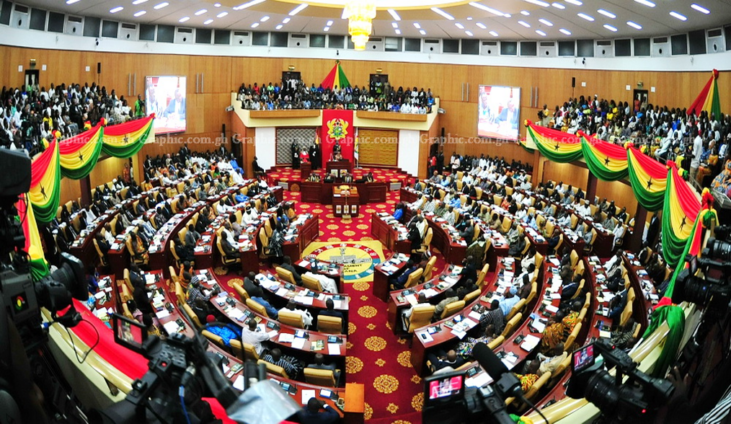Fresh revelations from a new book indicate that the Chief of Staff's office at the Jubilee House has been sending money to Parliament's Appointment Committee to expedite the approval of ministerial appointments.
In the book titled The President Ghana Never Got, investigative journalist Manasseh Azuri Awuni claims that this practice of financial inducement is not unique to the current administration but has persisted across multiple governments.
According to the book, a long-standing practice involves the Chief of Staff periodically sending money to members of the Appointment Committee during the vetting of ministerial nominees. This practice reportedly began under the Atta Mills presidency and has continued into the current administration.
Mahama Ayariga and some National Democratic Congress (NDC) MPs previously alleged that Boakye Agyarko, a former ministerial nominee, had attempted to influence the committee with money, a claim which was strongly denied by committee members. Muntaka Mubarak, a prominent figure in the committee, refuted these allegations, stating that no cash had been received from Agyarko. Instead, he claimed that any cash received by the committee came from the Jubilee House as part of a broader practice.
Regarding Mahama Ayariga and some NDC MPs' allegation that the Appointments Committee had received money from Boakye Agyarko, Mr Muntaka maintained the position and said it was untrue and added that neither he nor Joseph Osei-Owusu had met Boakye Agyarko before the allegation. He insisted that no such cash had come from Boakye Agyarko to him.
The book stated that: “I’m surprised that Muntaka was mentioned in this allegation as having received money from me to share with his members;" Joseph Osei-Owusu said. “Muntaka was stoutly against Agyarko.”
If you remember, Agyarko's consideration was delayed because Muntaka insisted that Agyarko had alleged that John Mahama was corrupt and that he must prove it. When we did the report, we delayed Agyarko's and Osafo-Maafo's for a while."
Muntaka however mentioned that the only cash that came to the Appointments Committee was from the Jubilee House, the Office of the President. When I asked who had sent the money and what it was meant for, Muntaka said it had been a longstanding practice that during the vetting of ministerial nominees, the Chief of Staff would periodically send money to members of the Appointments Committee. That cash usually came at the end of the week, and members of the Appointments Committee shared it."
The first Deputy Speaker of Parliament and Chair of the Appointment Committee since 2017, Joseph Osei-Owusu confirmed the practice of receiving money from the Chief of Staff but denied any involvement in facilitating payments from nominees.
The book says Mr Osei-Owusu explained that although the perception of money influencing committee decisions was prevalent, he had insisted that any such dealings should be directly between nominees and committee members.
"When I asked the 1st Deputy Speaker of Parliament, Joseph Osei-Owusu, about the money from the Chief of Staff to the committee, he confirmed it. Mr. Osei-Owusu has chaired the Appointments Committee of Parliament since 2017. He entered Parliament during the Mills presidency and had since been on the Appointments Committee. He said the perception of paying money to committee members was so rife that ministerial nominees often approached him, offering to pay money."
"Before the (2017) vetting started, I discussed with the Majority Leader that I could not take money on behalf of the members, so if a nominee wanted to give money to anybody, he should deal directly with that person. But because of that perception, some of the nominees came to me and said, Mr. Speaker, is there something we should do?' When I said no, they said, 'Are you sure? It's me o, you can trust me. We want to be generous to the committee." He told the nominees, "Whoever you want to be generous to, deal with the person."
He said he was surprised that after refusing to mediate payments from ministerial nominees to committee members, he stood accused of receiving money from Agyarko and giving it to Muntaka to be paid to influence the NDC members to pass the nominee.
He however admitted making intermittent calls to the Chief of Staff when members of the Appointment Committee approached him with demands for "motivation".
Latest Stories
-
Trump signs executive order extending tariff deadline to August 1
4 hours -
Midweek misery to Friday freedom: A personal journey through Ghana’s new holiday reform
4 hours -
We’re streamlining the galamsey fight, too many are running helter skelter – Mahama
4 hours -
Mahama attributes cedi stability to reforms in gold trading sector
4 hours -
Police arrest key suspect in motorbike theft ring in Accra
4 hours -
Journalists urged to drive urban health awareness through data-driven, science-based storytelling
6 hours -
KNUST Optometry 8th White Coat Ceremony tackles refractive error setbacks to improve access
6 hours -
I’m devastated – Akufo-Addo mourns Akwatia MP Ernest Kumi
6 hours -
IMF Executive Board approves $370m disbursement for Ghana
6 hours -
Castel Group acquires GGBL
6 hours -
Mr. President, your Six-Pillar 24H+ Economic Policy is shaky
6 hours -
T-bills auction: Undersubscription to continue in coming weeks; government misses June 2025 target by 19%
6 hours -
FUND24, the weakest pillar of Ghana’s 24H+ economy: APL cautions President Mahama
6 hours -
Ghana’s tourism picks up in 2024, but cost still a big issue
6 hours -
EKAJ Educational Fund partners UCC to train local artisans to improve standards
6 hours

